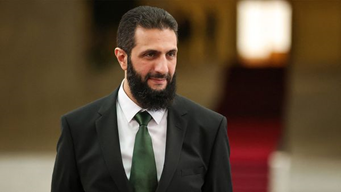But he has given no details of what kind of state he wants to build
ON JANUARY 29th cafés across Damascus were packed. Syrians, both recently returned exiles from Europe and Turkey and those who had remained in Syria under Bashar al-Assad, its long-time dictator, gathered to listen to a speech by Ahmed al-Sharaa, the country’s de facto ruler since the ousting of Mr Assad. Some wore headscarves. Others sipped beer. All were eager to hear Mr Sharaa’s vision for their country.
In the end it was not the promised live address to the nation. Instead it was a short delayed speech, pre-recorded before a crowd of selected militiamen. His words were grandiose, but vague. “We broke the chains and the tortured were freed,” he proclaimed. “We removed the dust of humiliation and disgrace from Syria’s shoulders.” Mr Sharaa, a former al-Qaeda leader turned would-be statesman, then declared himself as Syria’s interim president.
Most of the speech was leaked in advance. Mr Sharaa’s appointment and early edicts were drip-fed to state media over the course of the day in a series of confusing statements by a senior military commander in Hayat Tahrir al-Shams, the rebel group Mr Sharaa led against Mr Assad. The commander appointed Mr Sharaa interim president, dissolved Mr Assad’s Baath Party, and announced the formation of a legislative council that will govern Syria until a new constitution can be agreed.
But the speech offered little clarity on what comes next for Syria. There was no timetable for a much-announced but repeatedly delayed national convention where the new constitution would be decided. Nor were there any details about the kind of state Mr Sharaa intends to build.
He had spent the day with the leaders of Syria’s myriad armed factions, trying to persuade them to disband. Over seven weeks after the fall of Damascus, the fate of these groups is still uncertain. His aides claim that all militias will be dissolved and then absorbed into a new national army.
Some have agreed, but there are still holdouts—including some of the most powerful of Syria’s most armed groups. The Syrian Democratic Forces, a Kurdish militia backed by America that dominates the north-east, were conspicuously absent from Mr Sharaa’s victory rally. Southern factions remain uneasy about the presence of foreign fighters, while hardline Islamists bristle at his increasingly secular tone.
Mr Sharaa seems most concerned with the fate of Syria’s armed factions. In recent weeks his new defence minister has held talks with nearly 150 groups. Some have ended in vague assurances; others in shouting matches and slammed doors. A unified national army still seems a distant possibility, but it could not be more urgent. Sectarian violence is rising in parts of the country. Meanwhile Western officials believe it is only a matter of time before the revival of Islamic State, a jihadist terrorist group that once controlled swathes of Syria, disrupts the country’s transition.
Still, Mr Sharaa is making some progress elsewhere. Syrians are starting to return from abroad. Notables from all walks of society are clambering to meet him, and the EU and America have already announced the easing of some sanctions (though they show no signs of budging on key areas such as those on banks and financial institutions). In the coming days he will travel to Saudi Arabia—his first trip abroad since Mr Assad’s regime fell, and his first as president. And as The Economist went to press, he was preparing to receive the emir of Qatar, the first head of state to visit him in the Syrian capital.
Mr Sharaa’s rule rests on fragile foundations. If his presidency is to have clout, he needs a clear plan for how to rebuild Syria. That might be better announced to his own people, not just his fighters.





0 Comments